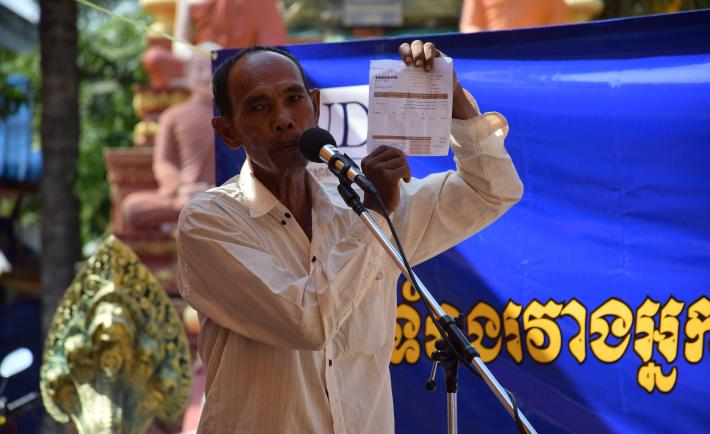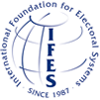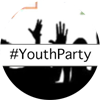
At a constituency dialogue event in Cambodia, a participant displays his electricity bill to show members of the National Assembly how expensive energy is in his village, and asks them for a solution to rising costs. NDI helped organize the constituency dialogue event. (Photo by NDI's Chhiv Kimsrun)
Citizen access and influence in political decision-making can vary across identity groups. NDI programming helps citizens expand civic space and streamline processes to enhance their own political participation, with a cross-cutting priority to support the inclusion of historically marginalized populations. The Citizen Participation team provides a weekly resource to assist NDI staff in meeting the objectives of their programs. This past month’s resources discussed the need to lower barriers to voter registration for people with disabilities, how to partner with faith-based organizations and religious leaders, and the use of ICTs in women’s empowerment. The Citizen Participation team also partnered with the Political Parties team to organize a ‘TweetTalk’ on what political parties can do to include youth in the political process.
Here are this month’s resources from the Citizen Participation Team:

“Disability Inclusion in the Voter Registration Processes,” published by the International Foundation for Electoral Systems and the Cambodian Disabled People’s Organization, discusses legal, social and physical barriers to voter registration in Cambodia and has broad applications for ensuring people with disabilities are guaranteed their political rights across regions. Voter registration processes may be physically inaccessible in practice because they do not include proper assistive tools like braille registration forms or wheelchair ramps. Forming cross-sector coalitions between disabled persons’ organizations, other CSOs, electoral commissions and political parties can be an effective way to assess and improve the accessibility of electoral processes.
“Guidelines on Engaging with Faith-based Organizations and Religious Leaders,” published by the United Nations Development Program highlights how such organizations can help draw government officials’ attention and increase buy-in among citizens to expand a program’s reach to individuals who might not otherwise be engaged. Practitioners should develop inter-religious partnerships and work with organizations that are able to give a voice to people in the community and remain accountable.
“Do digital information and communications technologies (ICTs) increase the voice and influence of girls and women?” from the Overseas Development Institute assesses how women access and use digital ICTs and the effect this has on their political decision-making power. Digital ICTs can increase women’s voice by improving their self-confidence, providing channels for self expression, and increasing their access to information and ability to make independent decisions. Through sharing ideas online and by creating new networking opportunities, ICTs provide an opportunity for women to collectively influence political structures. However, gender- and class-based exclusion limit or prevent some women, particularly poor women, from using digital ICTs.
 International Youth Day blog post is a summary of a ‘TweetTalk’ hosted by NDI’s Citizen Participation and Political Parties teams on August 12, 2015 in honor of International Youth Day. The TweetTalk was an online Twitter discussion that enabled youth activists, civil society organizations and development practitioners to share ideas of how political parties can support youth political participation. Autonomy and inclusion emerged as crucial elements of youth engagement. Youth participation increases when there is space for youth to develop and express ideas through engagement with civil society and elected officials.
International Youth Day blog post is a summary of a ‘TweetTalk’ hosted by NDI’s Citizen Participation and Political Parties teams on August 12, 2015 in honor of International Youth Day. The TweetTalk was an online Twitter discussion that enabled youth activists, civil society organizations and development practitioners to share ideas of how political parties can support youth political participation. Autonomy and inclusion emerged as crucial elements of youth engagement. Youth participation increases when there is space for youth to develop and express ideas through engagement with civil society and elected officials.
Click here for an archive of past resource digests.


